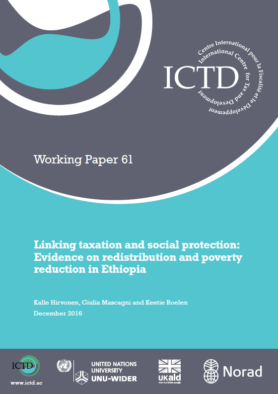ICTD Working Paper 61
The reduction of poverty, and more recently inequality, are pressing concerns in many low- and middle-income countries, not in the least as a result of the Sustainable Development Goals committing countries to significant improvements by 2030. Redistribution is important for reaching these goals, and is shaped by countries’ tax and welfare systems. Despite redistribution resulting from the simultaneous effect of revenue collection and public expenditures, policies and analyses of their distributional effects have largely been undertaken from narrow and singular perspectives.
In this paper, we aim to jointly assess the distributional effect of taxes and transfers (through social protection) using Ethiopia as a case study. We find that currently Ethiopia’s flagship social protection programme is more effective than income taxation in achieving poverty reduction, while neither policy achieves a sizeable reduction in overall inequality.
Overall, our findings provide support for the common belief that social spending is more suitable than taxation to achieve redistribution. We also assessed whether Ethiopia would have the capacity to achieve the desired level of redistribution by applying higher marginal rates on relatively high incomes. Our results suggest that Ethiopia does not currently have the capacity to close the poverty gap, or to fully fund its main safety net programme using domestic income sources alone.
